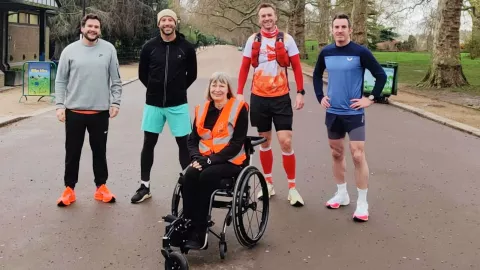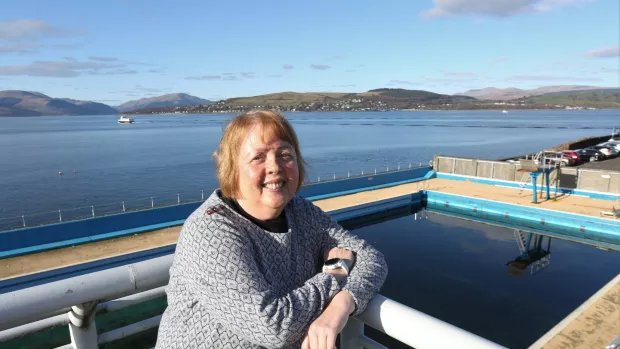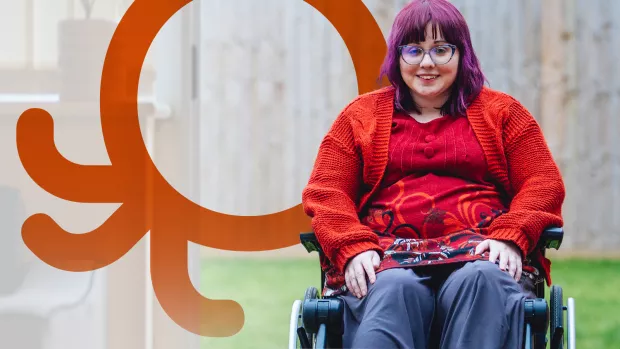
“Training has been a total voyage of discovery”
Sara Weller lives with progressive MS and is part of our Stop MS Appeal Board. She’s currently training for this year’s London Marathon to help raise money for research.
I was diagnosed with progressive MS in July 2009. The first thing I remember about my MS was losing the feeling in my feet after I’d done a day trip to India with work. I was told there was nothing to worry about and, for two years, nothing else happened.
Read more about the different types of MS
But then, one day, looking through my right eye was like looking through a window covered in rain drops. And two months later, after lots of tests and a 90-minute full body MRI, my MS diagnosis was confirmed.
It was like being hit by a train – my mind went blank and I couldn’t make sense of it. Why me? What are the treatments and prognosis? Will my daughter get it?
MS and my mobility
Everyone’s MS is different. Mine stole my ability to walk and was progressing, fast. But my sister was amazing – “you’re not just a pair of legs”, she told me. My boss was also incredible. I managed a big company with a lot of stores and he said “I don’t care if you have to visit the stores in a wheelchair. I don’t employ you for your legs!”
As I look back, we were all obsessed with the idea of me not being able to walk. This is something I’m now finally having to come to terms with after nearly 14 years of living with MS.
Read more about balance, walking and dizziness
In the early days, there were no treatments for progressive MS. But I thought if I could stay on my feet long enough, the treatments would be found. And I thought my condition would be stopped in its tracks before I had to use a wheelchair full-time.
How I’ve supported MS research
Over the last 13 years there’s been progress. But, as a person with MS, it’s felt very slow. I take fampridine to improve my poor walking, though it’s not available on the NHS in England and is expensive. There are only a handful of disease modifying therapies available on the NHS for people with progressive MS – I started taking one of them, siponimod (Mayzent), recently.
I could see more money was needed to help speed up research, so I decided to start fundraising myself.
I created a social media campaign called #MSMustStop. It got incredible support from some fantastic friends and many of the country’s biggest business leaders. But to raise real money I knew I had to challenge myself much more.
Hear from people who featured in the #MSMustStop campaign
Signing up for the London Marathon
The London Marathon had just introduced ‘assisted wheelchair’ places where a wheelchair user could be helped on the course. I took the plunge and decided to enter myself to raise as much money as I could for the Stop MS Appeal.
Training has been a total voyage of discovery. When I started, I’d only wheeled about 400 yards. I train three to four times a week now. And I’m spending five to six hours at the weekend doing over 15 miles around my local housing estates.
I’ve added a free-wheel to the front of my chair and learned about the importance of the right gloves. I also know the most edible energy bars and the best music to train to (80s pop for speed, audio books for long trips to ease the boredom).
It’s tiring and time consuming, but totally worth it. I’m fitter and sleeping better. And I have something really interesting to talk about other than how bad my balance is today. Or why I can’t stand up long enough to do all the ironing in one go.
Raising money for research
Most importantly of all, with the help of a brilliant support team, I’ve raised over £130,000 for the Stop MS Appeal so far. This’ll go straight to research to find treatments to slow and stop progression in MS. The treatments might be too late for me. But they might help newly diagnosed people in the future to live a life free from the worry of what tomorrow might bring.
Thank you for any help you can give me. All donations go straight to the MS Society to support vital research into stopping MS.
You can read about #MSMustStop and keep up to date with Sara’s training on her website.




